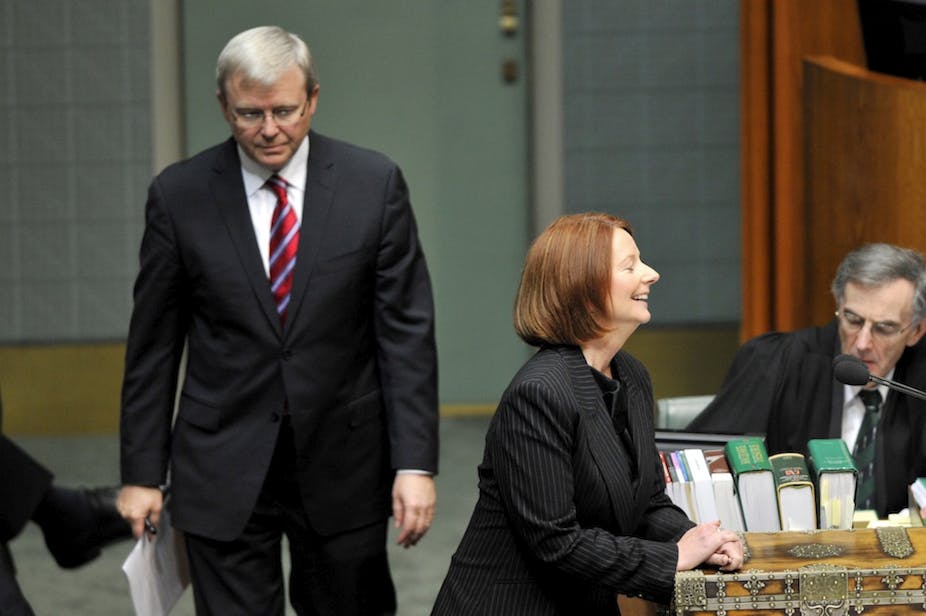You have to wonder how many times the Labor party will make the same mistake. Immediately prior to the 2010 election the party dumped Kevin Rudd and replaced him with Julia Gillard. The net effect of this was to ensure that the government could not run for re-election on its record. Now immediately before the 2013 election the party dumped Julia Gillard and replaced her with Kevin Rudd. The net effect of this will be to ensure the government will not be able to run on its record.
Now this observation is true, irrespective of what you think of either record.
To be blunt, the record isn’t good. The Rudd government was marred by excessive spending on the stimulus packages of 2008 and 2009. The bungled implementation of the stimulus spending that led to house fires and deaths and knocking down perfectly good school halls only rebuild them was not a record anyone would want to run on. Then there was the mining tax.
The Gillard government has similar problems – the broken promise of “no carbon tax under a government I lead” has been fatal to her re-election prospects and the continual promises to re-balance the budget has seen her economic credentials shredded. The revised mining tax raised very little revenue.
To be generous – bad luck and poor circumstance have contributed to the problems the government faces. But there has been a fundamental problem of competence. Rather incompetence. Former finance minister Lindsay Tanner famously remarked that the Rudd government didn’t dot the i’s or cross the t’s. The Gillard government was no improvement.
So here is the rub: what difference will a change in prime minister have on business confidence at this stage of the electoral cycle? In my view, none.
Kevin Rudd has been able to convince his colleagues that he is a reformed man. He has learned from his mistakes. This must be a good thing – yet, the challenge for any prime minister isn’t that they learn from their mistakes but that they have a vision for the nation and policy ideas to implement that vision.
Yet we know that Rudd had no policy ideas in 2008. After ratifying the Kyoto Protocol, apologising to the Stolen Generation, and dismantling the Howard government’s border protection regime, Rudd had no ideas. He summoned 1000 of the best and brightest of Canberra for a summit to brainstorm ideas. The only idea to come out of that was the mining tax – we all know how that turned out.
Rudd now has to articulate what ideas he has. Bear in mind that the parliament rises this week and won’t sit again before the election. So there is little opportunity to implement any new ideas. At the same time several ministers have resigned their positions, so who will do the work? He must take any new ideas to an election. Also he must win that election.
This is what business will be considering – can Rudd win an election? The answer must be “no”. In video games you can always hit the re-set button. In real life – that option is simply not available. To win an election Rudd must invite the electorate to imagine the last five years hasn’t happened. That next time will be different. I doubt he will succeed.
Rudd will be a lame duck, caretaker prime minister. His job will be to save as many Labor seats as he can. In the meantime consumers will continue to be cautious, business will continue to be cautious, and voters will get to clean up the mess.

